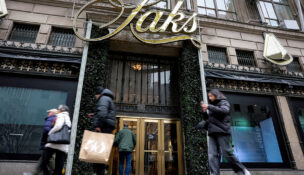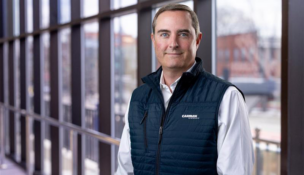Bio-plastic startup wins Lighthouse Labs pitch contest
Ourobio was shark favorite from accelerator's spring 2022 cohort
Bio-plastic startup wins Lighthouse Labs pitch contest
Ourobio was shark favorite from accelerator's spring 2022 cohort
While pitching to the sharks, entrepreneur Alec Brewer told them, “I do have white powder in my pocket,” before quickly clarifying that it wasn’t an illicit substance: “It’s PHB! It’s PHB!”
Brewer passed the vial over for the sharks’ inspection during his Lighthouse Labs Demo Day pitch Thursday for his company, Ourobio, of which he is co-founder and CEO. Formerly Transfoam LLC, the Charlottesville-based company makes biodegradable plastics — polyhydroxybutyrate, or PHB — from waste, in an effort to reduce microplastic pollution by creating a biodegradable option. Ourobio uses whey, a byproduct of cheese and yogurt manufacturing, and converts it into PHB through a biochemical process.
“It really didn’t capture all that we’re capable of,” Brewer said of the name change. “We’re trying to be a synthetic biology and circular economy company. We chose ‘Ourobio’ inspired by the ouroboros, which is an ancient symbol represented by a dragon or a snake eating its own tail, and thus circularity.”
Ourobio was voted “shark favorite” out of the nine entrepreneurs in Richmond business accelerator Lighthouse Labs’ 2022 spring cohort who pitched to four business leaders as part of the Demo Day competition Tuesday. As shark favorite, Ourobio received $1,500 in cash from sponsor ThinkNimble, and will get to name a tagged great white shark that Lighthouse Labs is sponsoring.
Founded in 2012, Lighthouse Labs is a mentor-driven nonprofit accelerator that runs two 12-week cohort sessions each year, investing $20,000 equity-free in six to 10 early-stage startups. Entrepreneurs accepted into the program receive mentorship and education on scaling up their businesses. Lighthouse Labs has accelerated more than 80 companies during the last 10 years, providing more than $1.6 million in equity-free funding. The Demo Day pitch contest is the grand finale event for each cohort.
Llamawood CEO Hunter Garen won the audience vote in the Demo Day competition; for his prize, he’ll get to throw the first pitch at the Richmond Flying Squirrels game Thursday.

While it may not apply to his throwing arm, Garen started his business pitch Tuesday with a flourish, tossing postcards with coupon codes into the first few rows. Llamawood connects firewood suppliers and purchasers.
“I designed for a woman in mind because, as they say, women’s standards are much higher than men’s, so if you design for a woman, you’ll make every man happy,” Garen joked when telling the sharks about his customer demographics.
The sharks judging the Lighthouse Labs Demo Day competition were:
- Ajay Kori, co-founder of UrbanStems and Novilla Pharmaceuticals
- Claire Herring, chief learning officer and co-founder of Blue Ocean Brain
- Richard Wintsch, executive director of Startup Virginia
- Joy Polefrone, health innovation consultant for VCU Health
Also pitching at the competition were founders of startups LipLoveLine, Viora Health, Kinometrix Inc., Hoth Intelligence, Nessle, On-Time Trials and CaseCTRL.
Richmond-based LipLoveLine is a niche health and beauty company focused on lip care and makeup: “No full face of makeup necessary; we’re focused on the lips,” founder and CEO Briana Williams said.
Philadelphia-based Viora Health has created a software solution to help reduce disease progression in underserved patients. Currently, the company markets its software to health systems, but founder Deboleena Dutta hopes to expand to employers, Medicare Advantage plans and the pharmaceutical industry. The software’s goal is to improve health outcomes and reduce unexpected costs from incidences like trips to the emergency room.
Fort Belvoir-based Kinometrix Inc. uses a machine learning algorithm to assess, in real time, the risk of a hospital patient falling, with the goal of expanding to other hospital-related health conditions. Founder and CEO Devina Desai said Kinometrix beats competitors with its accuracy. “Our module for in-patient falls is greater than 95% accurate,” she said. “The competitors still used by hospitals are somewhere between 54 to 57% accurate.”
Philadelphia-based Hoth Intelligence has created a patented AI and machine learning system to assist providers with bedside procedures, such as inserting catheters. It uses a CT or MRI scan of a patient to map the necessary internal structures through a virtual reality headset. “Running all that out of just the headset, nobody’s doing that just right now,” co-founder and CEO Tyler Alexander said.
Richmond-based Nessle offers a platform to connect new and expecting parents with service providers such as doulas or sleep specialists.
Austin, Texas-based On-Time Trials uses AI algorithms to track clinical trials and alert clinical research associates when trials are in danger of running behind.
Houston-based CaseCTRL co-founder and CEO Pamela Singh worked with her husband, orthopedic surgeon Dr. Ashvin Dewan, to create an intelligent surgical scheduling and coordination system after one of Dewan’s patients’ surgeries was canceled due to an administrative oversight. “High-tech surgeries are being supported by low-tech manual paper processes, and it’s harming patient care,” Singh said.
After her husband began using the cloud-based platform in his own practice, he saw a 20% decrease in patient cancellations, she said. When hospital administrators approached him to ask what he was doing right, the couple realized they had a marketable product.
C

















